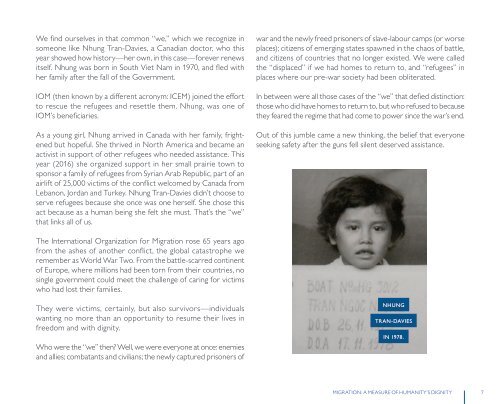English
IOM 65 anniversary book
IOM 65 anniversary book
Create successful ePaper yourself
Turn your PDF publications into a flip-book with our unique Google optimized e-Paper software.
We find ourselves in that common “we,” which we recognize in<br />
someone like Nhung Tran-Davies, a Canadian doctor, who this<br />
year showed how history—her own, in this case—forever renews<br />
itself. Nhung was born in South Viet Nam in 1970, and fled with<br />
her family after the fall of the Government.<br />
IOM (then known by a different acronym: ICEM) joined the effort<br />
to rescue the refugees and resettle them. Nhung, was one of<br />
IOM’s beneficiaries.<br />
As a young girl, Nhung arrived in Canada with her family, frightened<br />
but hopeful. She thrived in North America and became an<br />
activist in support of other refugees who needed assistance. This<br />
year (2016) she organized support in her small prairie town to<br />
sponsor a family of refugees from Syrian Arab Republic, part of an<br />
airlift of 25,000 victims of the conflict welcomed by Canada from<br />
Lebanon, Jordan and Turkey. Nhung Tran-Davies didn’t choose to<br />
serve refugees because she once was one herself. She chose this<br />
act because as a human being she felt she must. That’s the “we”<br />
that links all of us.<br />
war and the newly freed prisoners of slave-labour camps (or worse<br />
places); citizens of emerging states spawned in the chaos of battle,<br />
and citizens of countries that no longer existed. We were called<br />
the “displaced” if we had homes to return to, and “refugees” in<br />
places where our pre-war society had been obliterated.<br />
In between were all those cases of the “we” that defied distinction:<br />
those who did have homes to return to, but who refused to because<br />
they feared the regime that had come to power since the war’s end.<br />
Out of this jumble came a new thinking, the belief that everyone<br />
seeking safety after the guns fell silent deserved assistance.<br />
The International Organization for Migration rose 65 years ago<br />
from the ashes of another conflict, the global catastrophe we<br />
remember as World War Two. From the battle-scarred continent<br />
of Europe, where millions had been torn from their countries, no<br />
single government could meet the challenge of caring for victims<br />
who had lost their families.<br />
They were victims, certainly, but also survivors—individuals<br />
wanting no more than an opportunity to resume their lives in<br />
freedom and with dignity.<br />
Who were the “we” then? Well, we were everyone at once: enemies<br />
and allies; combatants and civilians; the newly captured prisoners of<br />
NHUNG<br />
TRAN-DAVIES<br />
IN 1978.<br />
MIGRATION: A MEASURE OF HUMANITY’S DIGNITY<br />
7


